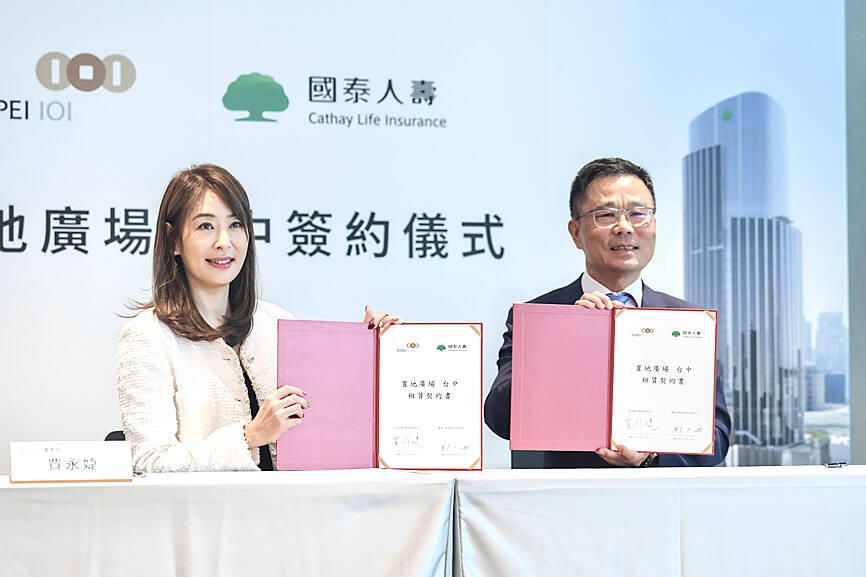Taipei 101 operator Taipei Financial Center Corp (台北金融大樓) and Cathay Life Insurance Co (國泰人壽) yesterday signed an agreement to jointly enter the Taichung real-estate market with a new development project named Landmark Taichung (置地廣場台中).
The proposed building, which has 34 floors above ground and seven basement floors, would be built on a site near Taichung MRT City Hall Station, with total floor area of about 155,000m2 — including 115,000m2 of commercial space and 40,000m2 for parking lots, Taipei Financial said in a statement.
There would be a shopping mall spanning from the building’s B1 to seventh floor, designed to offer “innovative” retail experiences and “diverse” lifestyle options for consumers, the statement said.

Photo: CNA
The construction of the green building is expected to be completed in 2029, it said.
“Through this partnership, we hope to bring Taipei 101’s years of accumulated success to Taichung and create a new landmark that reflects a global vision and local culture,” Taipei Financial chairwoman Janet Chia (賈永婕) said in the statement.
“We aim to bring together refined, stylish, fun and unique brands to create a shopping destination that meets the needs of Taichung’s consumers and delivers a distinctive retail experience,” Taipei Financial president Julie Chu (朱麗文) said.
The Landmark Taichung is expected to open for operations in 2030, with an initial investment of NT$4.5 billion (US$136.2 million), Chia said.
Taipei Financial would operate the building via a 20-year lease with Cathay Life, she said.
It is expected to break even in about seven years, she added.
Cathay Life president Andrew Liu (劉上旗) said the collaboration would bring long-term and stable investment value to the company.

POWERING UP: PSUs for AI servers made up about 50% of Delta’s total server PSU revenue during the first three quarters of last year, the company said Power supply and electronic components maker Delta Electronics Inc (台達電) reported record-high revenue of NT$161.61 billion (US$5.11 billion) for last quarter and said it remains positive about this quarter. Last quarter’s figure was up 7.6 percent from the previous quarter and 41.51 percent higher than a year earlier, and largely in line with Yuanta Securities Investment Consulting Co’s (元大投顧) forecast of NT$160 billion. Delta’s annual revenue last year rose 31.76 percent year-on-year to NT$554.89 billion, also a record high for the company. Its strong performance reflected continued demand for high-performance power solutions and advanced liquid-cooling products used in artificial intelligence (AI) data centers,

SIZE MATTERS: TSMC started phasing out 8-inch wafer production last year, while Samsung is more aggressively retiring 8-inch capacity, TrendForce said Chipmakers are expected to raise prices of 8-inch wafers by up to 20 percent this year on concern over supply constraints as major contract chipmakers Taiwan Semiconductor Manufacturing Co (TSMC, 台積電) and Samsung Electronics Co gradually retire less advanced wafer capacity, TrendForce Corp (集邦科技) said yesterday. It is the first significant across-the-board price hike since a global semiconductor correction in 2023, the Taipei-based market researcher said in a report. Global 8-inch wafer capacity slid 0.3 percent year-on-year last year, although 8-inch wafer prices still hovered at relatively stable levels throughout the year, TrendForce said. The downward trend is expected to continue this year,

Vincent Wei led fellow Singaporean farmers around an empty Malaysian plot, laying out plans for a greenhouse and rows of leafy vegetables. What he pitched was not just space for crops, but a lifeline for growers struggling to make ends meet in a city-state with high prices and little vacant land. The future agriculture hub is part of a joint special economic zone launched last year by the two neighbors, expected to cost US$123 million and produce 10,000 tonnes of fresh produce annually. It is attracting Singaporean farmers with promises of cheaper land, labor and energy just over the border.

US actor Matthew McConaughey has filed recordings of his image and voice with US patent authorities to protect them from unauthorized usage by artificial intelligence (AI) platforms, a representative said earlier this week. Several video clips and audio recordings were registered by the commercial arm of the Just Keep Livin’ Foundation, a non-profit created by the Oscar-winning actor and his wife, Camila, according to the US Patent and Trademark Office database. Many artists are increasingly concerned about the uncontrolled use of their image via generative AI since the rollout of ChatGPT and other AI-powered tools. Several US states have adopted